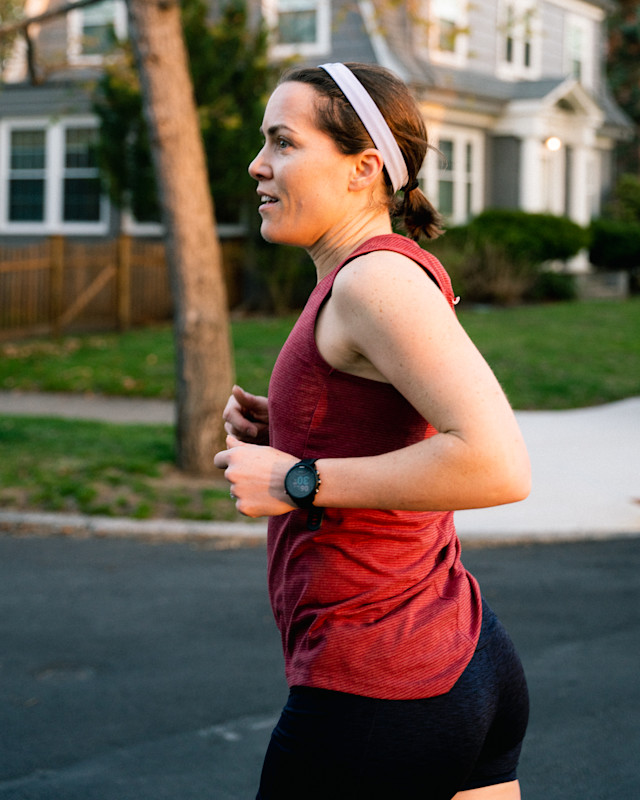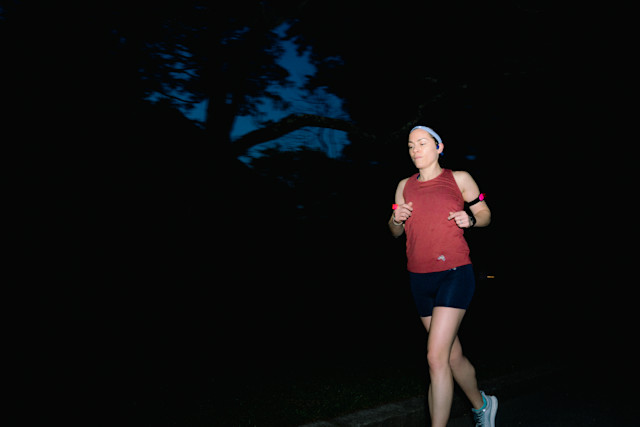How interpreting scientific data for a living did — and didn’t — change the way health economist Emily Oster trained for a marathon.
As a statistician, health economist, and economics professor at Brown University, it’s Emily Oster, Ph.D.,’s job to dig into the latest science on the best ways to live. The healthiest way to eat, best way to optimize athletic performance, and even how to raise kids are all areas she’s done a deep dive into.
Has having the latest scientific research at her fingertips impacted the way she lives? Of course. But Oster emphasizes that not every scientific study is worth changing your life for. “There are many studies out there, and they’re not all good. So actually, the frequency with which there is new data that really will change what you’re doing is pretty rare,” she says. Still, it happens. Ahead, Oster shares how to know what new information is actually worth our attention and how she’s applied what she learns to her own life, particularly in the way she works out.

The Science of Running and an Experiment of One
When deciding if a scientific study is worth focusing on, Oster says she has one main question in mind: How much of an effect is there? “For example, if I eat this food or do this activity, will it actually change my health in a meaningful way?” she says. Again, she reiterates that the majority of the time the answer is, not very much.
She says that diet is a perfect example of this. Sure, different trendy eating plans may make headlines — keto, paleo, alkaline are just a few — but the science behind the healthiest way to eat doesn’t change. “It’s still going to say you need to eat vegetables and get adequate protein,” she says.
One area of her life where Oster says that analyzing data has impacted her health is fitness. Oster is an avid runner and recently ran a marathon. She says that she runs in carbon-plate running shoes, based on scientific data that shows their effectiveness. (If you’re a runner, you may remember back in 2017 when Nike used them to attempt a sub-two hour marathon, spurring other brands to create their own carbon-plate running shoes.) A 2017 study published in Sports Medicine showed that carbon midsoles store energy as the foot hits the ground, creating a springy boost with each step. Researchers found that the shoes lowered the energy expenditure by four percent.
While studies like this can certainly be beneficial to know about, Oster says it’s important to remember that every person is a scientific study of one. In other words, what’s specific to you alone is perhaps what matters most. While training for the marathon, Oster says she worked with a nutritionist and, together, they figured out that she needed to consume more sodium because she was losing a lot through sweating. “I ended up taking salt tablets because I needed to replenish my sodium,” she says. This was something she learned not by analyzing scientific data about how much sodium runners should consume, but simply by realizing that she was sweating a lot and needed to find a way to give her body back some of the sodium she was losing.

Combining Emerging Data with Maternal Instinct
Perhaps the area that Oster focuses the most on is parenting. She’s written three books related to pregnancy and parenting, Expecting Better, Cribsheet, and The Family Firm. She also created the newsletter, ParentData, as a resource for parents who want to do their research and check out the scientific data surrounding decisions related to parenting. When it comes to using scientific data to inform how to parent, Oster emphasizes that it doesn’t supersede gut instinct. “I often tell people that data isn’t bossy. It isn’t going to tell you what to do. It needs to be combined with one’s preferences and own instinct,” she says.
Because of this, Oster says that there isn’t one perfect way to parent. “Parents want to do a good job. We want to be right and often we want to be so right that we can think our choices are right for everybody. But getting into the mindset that a [parenting] choice can be right for me and not right for everybody — even after seeing data — is an important point because the data is going to be combined with our preferences and values,” she says.
As with health studies, Oster says that, most of the time, new studies related to parenting aren’t all that surprising — something she says comes as a relief. Imagine waking up each day finding out the way you’re living is wrong! But she says that there is one scientific study that stands out to her in terms of the results. “One question many parents have is when to introduce allergens to kids,” Oster says. She explains that there was a long-held belief that you should wait to introduce highly allergenic foods, like peanuts, to kids until they are older. But a large randomized study found that actually the opposite is true. “It showed that kids should be introduced to allergens around four to six months. This is one place where [guidance] changed fairly dramatically,” she says.
With all this in mind, what is the biggest lesson when using emerging scientific data to enhance your life? It comes down to this: Marry what you learn with what your gut is telling you, and remember: You are your own best experiment. In the end, no scientist or doctor knows your body better than you.
